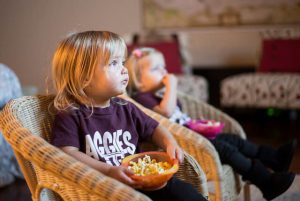

Aldrich encourages parents to let their child explore topics they’re passionate about that aren’t taught in-depth or at all in school. For example, if your child loves animals, search for and watch YouTube videos about farming or veterinary science together. “Every kid is dying to figure out, Who am I? What am I passionate about?'” Aldrich said. School often only hits the tip of the iceberg for any given topic that a child might love.

Expose your child not only to great books that he won’t come across in school, but also to today’s technological resources, such as blogs and Excel spreadsheets, which he’ll encounter often as an adult, Aldrich advises.

“Rather than dropping your kid off somewhere before you go to the grocery store, bring her with you,” he said. “Involve her in everyday experiences. She’ll get to see the world through your eyes, and you’ll get to see the world through her eyes.” Children will see math, reading, problem solving, and decision making in action when they’re along for the ride during “grown-up” activities.

Parents should consider settings and models outside of school for more individualized learning experiences in smaller groups, Aldrich said. Summer camps where kids spend more time outdoors than indoors, volunteer opportunities, libraries, community classes, and hands-on clubs like 4-H and Future Farmers of America can enrich children’s lives, he said. “Schools can’t do it all,” he said. Look outside the school walls for more tailored and engaging chances to learn.

Aldrich advises exposing your child to adults in situations where they can be seen as peers. “Look for people within your own network of friends who have common interests with your child,” Aldrich said. For example, if your child loves buildings, introduce him to an architect. Let kids and adults mix and mingle from time to time rather than only having “adult parties” and “kid parties,” he said.

Portfolios aren’t just for artists or adults applying for jobs or graduate school. They’re a helpful tool for students of any age, and they should contain a few pieces of work that best represent your child and what he’s passionate about, Aldrich said. The contents may include references to his volunteer work in the local newspaper, awards from clubs outside of school, and photos or even video clips of him doing what he loves. Portfolios can evolve over time with your child’s interests. They can really help your child stand out in a crowd and feel proud as an individual, Aldrich said.

To “minimize the drop off” and maximize the time spent with your kids, Aldrich advises walking (instead of driving) between destinations so that you and your children can observe the world together on foot, and under-scheduling rather than over-scheduling your kids so that they’re learning through life itself and not just through planned activities.
“No one in the world knows your child as well or loves your child as much as you do,” Aldrich said. That makes you the ideal person to enhance her learning and expand her mind.
Clark Aldrich holds a degree in cognitive science from Brown University and is the author of four books.
 Click here to purchase Unschooling Rules: 55 Ways to Unlearn What We Know About Schools and Rediscover Education.
Click here to purchase Unschooling Rules: 55 Ways to Unlearn What We Know About Schools and Rediscover Education.




